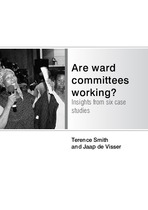| dc.contributor.author | Smith, Terence | |
| dc.contributor.author | de Visser, Jaap | |
| dc.date.accessioned | 2019-08-19T08:24:59Z | |
| dc.date.available | 2019-08-19T08:24:59Z | |
| dc.date.issued | 2009 | |
| dc.identifier.citation | Smith, T. and de Visser, J. 2009. Are ward committees working? Insights from six case studies Cape Town: Community Law Centre, University of the Western Cape | en_US |
| dc.identifier.isbn | 9784868086948 | |
| dc.identifier.uri | http://hdl.handle.net/10566/4856 | |
| dc.description | Ward committees have been the focus of considerable attention by government as well as civil society, with substantial investment already made in an attempt to ensure that these structures have the necessary capacity and resources required for them to fulfil their envisaged roles as a ‘voice’ of communities. At the same time, questions have been asked about how effective these institutions actually are; whether they are useful conduits for community involvement in local governance; whether, as ‘created spaces’ for public participation, they are inherently capable of playing the critical role expected of them; and whether they create opportunities for real power-sharing between municipalities and citizens. The research presented in this book sets out to offer a deeper and more nuanced understanding of the functioning and value of ward committees. In-depth qualitative studies of six ward committees are described. They provide insights into how ward committees are functioning and the key reasons behind the dysfunctionality that appears to plague the majority of ward committees. They also provide lessons for the future to strengthen the role of ward committees. | en_US |
| dc.description.abstract | The research presented in this book sets out to offer a deeper and more nuanced understanding of the functioning and value of ward committees. In-depth qualitative studies of six ward committees are described. They provide insights into how ward committees are functioning and the key reasons behind the dysfunctionality that appears to plague the majority of ward committees. They also provide lessons for the future to strengthen the role of ward committees. It is envisaged that this resource book will be useful for local government councillors and practitioners, ward committee members, policy makers and ordinary citizens interested in the structures of participatory local governance. | en_US |
| dc.description.sponsorship | Interchurch Organisation for Development Co-operation
Charles Stewart Mott Foundation
Austrian Development Cooperation
Ford Foundation | en_US |
| dc.language.iso | en | en_US |
| dc.publisher | Community Law Centre, University of the Western Cape | en_US |
| dc.subject | Ward committees | en_US |
| dc.subject | Local democratic participation | en_US |
| dc.subject | Community participation | en_US |
| dc.subject | Participatory local governance | en_US |
| dc.subject | Ward committee policy | en_US |
| dc.title | Are ward committees working? Insights from six case studies | en_US |
| dc.type | Book | en_US |

